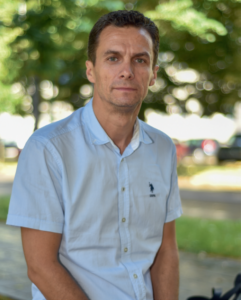Sarajevo Energy and Climate Week, SECW, will be held in Sarajevo from September 25 to 29, 2023. The focus of this event is just transition and decarbonization of the energy sector with the aim of achieving climate neutrality and establishing a circular economy. We talked about SECW, and also about the key topics of implementation of energy transition in Bosnia and Herzegovina, with Amra Šurković, general manager of SECW and prof. dr. Azrudin Husika, professor at the Faculty of Mechanical Engineering of the University of Sarajevo, expert in energy transition and member of the SECW Program Board.
This event is organized by the Chamber of Commerce of the Federation of Bosnia and Herzegovina, under the patronage of the Ministry of Foreign Trade and Economic Relations of Bosnia and Herzegovina and the City of Sarajevo, and will focus on a just transition and decarbonization of the energy sector with the aim of achieving climate neutrality and establishing a circular economy.
We talked about SECW, and also about the key topics of implementation of energy transition in Bosnia and Herzegovina, with Amra Šurković, general manager of SECW and prof. dr. Azrudin Husika, professor at the Faculty of Mechanical Engineering of the University of Sarajevo, expert in energy transition and member of the SECW Program Board.
MORE THAN 1000 PARTICIPANTS
“The Sarajevo Energy and Climate Week SECW is an international event focused on the just transition of the energy sector, taking into account climate goals and decarbonization of the energy sector in BiH and the Western Balkans region.
Rich experience and heritage of Bosnia and Herzegovina in the field of energy has made Bosnia and Herzegovina a regional leader, and in order to remain so, it is necessary to continue to monitor trends in the energy sector, to make sometimes difficult but correct decisions about the future of the energy sector, recognizing that the ultimate goal is the decarbonization of the energy sector, and that is ending the use of fossil fuels by 2050, especially coal.
Within SECW, through presentations, discussions, meetings and fairs, energy and climate policies, goals and opportunities in the field of energy and climate, energy systems of the future, innovative business models, challenges and opportunities in order to achieve energy security and climate neutrality, circular economy, improvement of air quality and environmental protection will be discussed.
The event is important, because it will bring together decision-makers at all levels and who are important for the future of energy in the region, experts who advise decision-makers and develop a strategic framework, entrepreneurs who invest and create new job opportunities, as well as representatives of the non-governmental sectors that advocate for the transparency of the energy transition.
Additional significance is reflected in the fact that, for the first time, the organization of an event of this level is led by domestic institutions”, SECW Amra Šurković has explained.
According to her, SECW should represent a roadmap for achieving climate neutrality and decarbonization of the BiH energy sector by 2050, and be a key event in the Western Balkans region for all employees in the energy sector.
“During five day interactive high level discussions, it is expected for the SECW to gather over 1000 participants from all over the world, including high-ranking officials, representatives of all levels of government, energy, climate and environmental, spatial organisation and traffic ministers, representatives of the institution of the European Union, Energy Communities, World Energy Council, producers of the most modern equipment such as heat pumps, solar plants, wind power plants etc., and the academic community, experts, entrepreneurs, investors, financiers, non-governmental organisations, the media and other interested people”, says Šurković.
As the introductory part of the SECW is dedicated to a just transition, we were interested in what exactly a just transition means and what its implementation specifically means for the economy, especially mines, and what for society as a whole?
“A just transition means switching from the use of fossil fuels to renewable energy sources in a socially sensitive way. This means that during the transition, which implies the gradual discontinuation of the use of fossil fuels, all social groups are taken into account. In the context of Bosnia and Herzegovina, a just transition refers primarily to regions that depend on coal mining, where in the transition process care must be taken to ensure that miners, as well as employees in activities related to coal mining, do not lose their jobs. There are successful examples of a just transition in the world that includes retraining of workers, making new job opportunities, construction of new infrastructure, use of local resources for new economic activities on devastated mining areas, reform of the education system, etc.
The implementation of a just transition for the economy of Bosnia and Herzegovina is a direction for development while achieving competitiveness at the global level. In the process of transition, large investments in renewable energy sources, energy efficiency, infrastructure construction, etc. are needed. All of this represents an opportunity, especially for private companies, for growth, regardless of what industry they are engaged in. A just transition allows us to all become energy producers, not just consumers, which has been the case so far.
For society as a whole, a just transition means new jobs that are of better quality than jobs in the traditional energy sector, as well as improving the state of the environment. In many cities in Bosnia and Herzegovina, the air is excessively polluted. The situation can be significantly improved by gradually reducing the use of coal with investments in energy efficiency”, explains Šurković.
The energy transition in Bosnia and Herzegovina has been discussed about for a long time, but we wanted to know in what phase our country is in when it comes to this process.
“In the last few years, there has been visible progress in the energy transition in Bosnia and Herzegovina. This was stimulated primarily by the rise in energy prices, which led to the competitiveness of renewable energy sources, especially through the model of the so-called prosumers and up to the profitability of investing in energy efficiency. The result is an accelerated growth of the installed capacity of renewable energy sources, primarily in solar power plants. In the last two years alone, more solar power plants have been built in Bosnia and Herzegovina than had been built in the period up to that point, and that without incentives from the state. Thousands of MW in new solar and wind power plants are under development. According to some data, these are capacities that are almost three times greater than the total existing capacities for the production of electricity in Bosnia and Herzegovina. Of course, not all of these power plants will be built, some will give up due to the inability to secure financing, some due to the inability to connect to the grid, and some due to the inability to obtain all permits. However, it should also be taken care of network balancing. Because of this, it would not be possible to accept all the energy from such a large capacity of solar power plants and wind power plants. In order to alleviate this problem, the construction of smaller solar power plants should be encouraged at the point of electricity consumption, i.e. on the roofs of factories and houses”, says prof. dr. Husika.
According to him, it is necessary to generally introduce mechanisms for guiding the transition through market mechanisms and the regulatory framework. A lot of work is also being done in that segment, but the results are not yet visible.
“The capacities of those responsible for these issues, such as ministries at all levels of government, are very limited, and the regulatory framework that we need to adopt is very complex. However, in this segment, work must be done much faster and the entire system reformed, which will enable the application of new business models such as the provision of energy services (so-called ESCO), public-private partnership, prosumers, then the introduction of a system of guarantees of energy origin, etc. , emphasizes prof. dr. Husika.
HOW TO BECOME A PART OF SECW EVENT?
We were interested in how interested parties can join SECW, a five-day international event, and be a part of this event
“Everyone who wants to be a part of this great story, introduce themselves, meet new business partners, exchange opinions with participants, can get involved as a patron, sponsor, participant, exhibitor, panelist, media partner. An exhibition area was also organized during the Conference, where manufacturers of modern energy technologies, such as heat pumps, solar power plants, and electric vehicles, among others, have already confirmed their participation.
More information about this event, as well as our contact information, can be found on the website www.secw.ba. It is also possible to buy registration fees for all days on the SECW website. Besides that, information about SECW is also available through social media,” says Šurković.
SERIOUS BARRIER
To carry out a complex process such as the energy transition, it is necessary to have appropriate material, financial and human capacities. And the real question is whether Bosnia and Herzegovina has them at this moment.
“Capacities for just energy efficiency transition are a serious barrier to a faster transition. First of all, this refers to human capacities. Insufficient number of people in competent authority are working on these issues. With complex state regulation, this is a serious problem. In addition, the education system changes slowly, we do not have enough personnel for some new occupations. There is a lack of qualified personnel for the design and installation of heat pumps, solar panels, etc.
Sources of financing are available, but they are conditioned by complicated and lengthy procedures for obtaining permits, not only for renewable energy sources, but also for energy efficiency, infrastructure construction, for example, installation of electric chargers, construction of pipelines for district heating”, emphasizes Prof. dr. Husika.
“As previously stated, in the last few years, serious work has begun on the energy transition, which represents a major economic and social change. Therefore, it has to be “talked” about for a long time to see the results on the field. The energy transition is not just about building new solar power plants and wind power plants, that’s why it’s going so slowly. Of course, the process should be accelerated, but the situation in Bosnia and Herzegovina should also be realistically observed,” says Prof. dr. Husika.
Each transition also requires certain material resources. In accordance with that, the question is legitimately asked whether there are, at least, preliminary estimates in BiH about how much the energy transition will cost BiH and how and in what way this process will be financed.
“According to the preliminary estimates given in the Integrated Plan for Energy and Climate of BiH, it is necessary to invest about 14.5-17 billion KM until 2030 in a just transition for the implementation of the NECP (National Energy and Climate Plan). However, it should not be seen as an expense, but as an investment that will create new jobs that can bring back at least a part of the workers who left BiH. These are investments that are returning, which is why a good part will come from private companies, both domestic and foreign,” emphasizes Prof. dr. Husika.
One of the key questions for the implementation of the energy transition is the question of the readiness of Bosnia and Herzegovina economy and population for active involvement in the energy transition process.
“Small and medium-sized enterprises are quite ready and some of them are already working on the energy transition, because the market dictates it to them. Encouraged by the programs of domestic and foreign organizations, a good number of small and medium-sized enterprises are working on replacing fossil fuels, installing solar power plants for their own needs and investing in energy efficiency solutions. However, there is not enough talk about this in the media, so one gets the impression that it is not being worked on it.
As for large companies, in some industries such as, for example, the cement industry, they are seriously working on the energy transition, switching to more sustainable energy sources, preparing for the introduction of fees for carbon dioxide emissions.
There are also clear decarbonization plans in the power sector. However, in some other industries, the shifts are much smaller,” says prof. dr. Husika.
Taken from: Business Magazine


